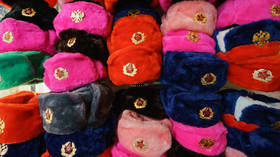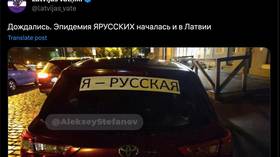EU state fines man €400 for wearing ‘Soviet hat’ – media

Estonian authorities have slapped a €400 ($426) fine on a man who crossed the border sporting a hat emblazoned with the Soviet coat of arms, according to local media. Soviet symbols, and more recently imagery related to the Russian state, are prohibited by law in the former Soviet republic.
According to the ERR media outlet, the Estonian citizen was stopped on Saturday when crossing from Russia. Officials notified him that the display of symbols of the “aggressor state” in public is banned, and issued a fine.
Back in May, police warned Estonians that the display of the Soviet or Russian flags or those of Russia’s Donbass republics, as well as the Latin letters Z and V, which have come to symbolize Moscow’s military campaign in Ukraine, are off limits during Victory Day events.
Officials stressed that people have the right to lay flowers at graves and WWII memorials on May 9, but should refrain from wearing any symbols that could be interpreted as supportive of Russia’s actions in Ukraine. Estonian police also stressed that they were closely monitoring social media platforms in case of similar violations online.
Those running afoul of the rule could face a fine of up to €1,200 euros ($1,345) or even prison time, local media reported at the time, citing police officials.
While in the West the victory over Nazi Germany is celebrated on May 8, in the Soviet Union commemorative events and military parades were traditionally held on May 9. The tradition carried over into modern-day Russia and most other former Soviet republics.
In August, Justice Minister Kalle Laanet revealed a proposal for amendments to Estonia’s election law that would bar Russian citizens from voting in municipal elections. The draft legislation, cited by local media, envisaged that the “temporary restrictive” measures would affect citizens of a foreign country that the EU or the Estonian legislature have designated an “aggressor state,” with Russian and Belarusian nationals mentioned specifically.
The idea was, however, criticized as potentially “unconstitutional” by some other members of the coalition government. Ethnic Russians constitute about a fifth of the Baltic state’s 1.3 million residents, of which an estimated 67,000 are Russian citizens who can currently vote in local elections.
Russian Foreign Ministry spokeswoman Maria Zakharova described the plan as “Russophobic,” and cited a report by UN Human Rights Council special rapporteurs that highlighted the “systematic human rights violations by Tallinn regarding minorities, their cultural rights and the right to education.”













